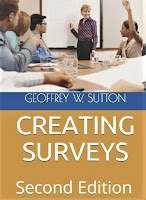Coefficient Alpha (also called "alpha") is a statistical value indicating the degree of internal consistency of items in a multiple-item scale like survey items or Likert-type scales.
Internal consistency is one measure of reliability for scores from scales, measures, and survey items.
The alpha statistic was developed by Lee Cronbach in 1951 thus it is also called Cronbach's alpha. In research reports, you may just see the Greek lower case letter alpha, α.
The procedure to calculate alpha can be found in SPSS under Analyze > Scale > Reliability.
For research purposes, scales with alpha levels equal to or above alpha = .70 are acceptable. The best scales have values of alpha = .9 or higher.
The alpha method works best to evaluate unidimensional measures. If there are two or more dimensions in a set of items, the alpha value will be lower so, when alpha values are low, consider which item or items do not support the primary dimension.
Cite this Post
Sutton, G.W. (2021, April 26). Coefficient Alpha or Cronbach’s
Alpha. Retrieved from https://statistics.suttong.com/2021/04/coefficient-alpha-or-cronbachs-alpha.html
Learn more about statistics in Applied Statistics Concepts for Counselors on AMAZON or GOOGLE
Learn more about surveys and statistics in Creating Surveys on AMAZON or GOOGLE
Please check out my website www.suttong.com
and see my books on AMAZON or GOOGLE
STORE
Also,
consider connecting with me on FACEBOOK Geoff W. Sutton
TWITTER @Geoff.W.Sutton
You can read many published articles at no charge:
Academia Geoff W Sutton ResearchGate
Geoffrey
W Sutton
__________________________________
Calculating Cronbach’s Alpha
Example
Here is my prompt:
This is what the paste looked like in Copilot.
Here's the Basic Response
📊 Interpretation:
The item-total correlations table
Interpretation:
Here is the basic report in APA style.
APA-Style Reliability Report: Hope Scale
Method
Results
RELATED POSTS
Adult Hope Scale by C. R. Snyder
My Research Books - FREE samples
Page updated 22 August 2025



Comments
Post a Comment